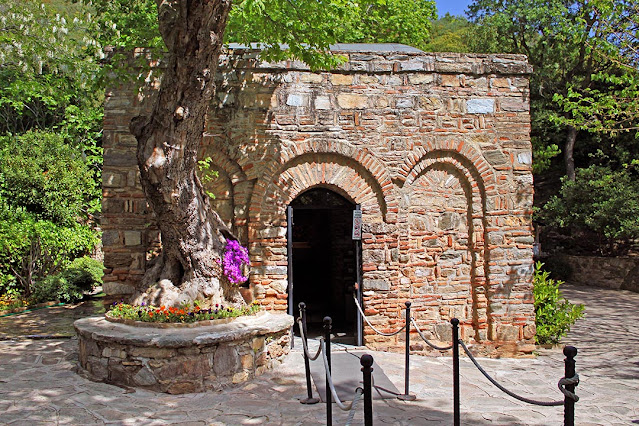Posted this on twitter yesterday and thought I’d repost here (reflecting
on Sunday’s sermon on Matt 12:46-50 and the mention of Christ’s mother and
brethren “standing without”):
Interesting how many of the early Protestant interpreters see the
"brethren" of Jesus as kinsmen rather than siblings. M. Poole on Matt
13:55-56: "For the brethren of Christ and his sisters, here mentioned, the
most of them understand his near relations."
M. Poole on "brother" in Mark 6:3: "that is, the kinsman,
(as most interpret it,) supposing Mary, the mother of our Lord had no more
children: I shall not determine it."
M. Poole on the brethren of Mark 6:3 (cont.): "They say these four
were the children of Mary, sister to the mother of our Lord, and the wife of
Cleophas [Mark 15:40; 16:1]."
JTR
Note: See also my article, "Who Wrote the Epistle of James?"

6 comments:
Enjoyed this brief post, as well as your journal article “Who Wrote the Epistle of James?” It is intriguing to look at whether there might be as many as four James in the NT, or as few as two. John MacArthur’s comment that “No one has seriously considered James the Less, the son of Alphaeus [as author of the epistle of James]” is sort of surprising. You don’t have to dig too hard to find that isn’t true. Matthew Henry’s commentary is widely available in print and online. Easton’s Bible Dictionary is easily accessible online. It says, “The son of Alphaeus, or Cleopas, ‘the brother’ or near kinsman or cousin of our Lord…was the author of the epistle which bears his name.”
The timing of your post seemed providential in that I spent a good portion of time today looking at a related matter, why Ιακωβος is translated James rather than Jacob (or Jacobus). I had not given that any attention, until the question came up. I was intrigued by the consistent use of ιακωβ (without any declension regardless of case) when referring to the patriarch Jacob (25 times) and the father of Joseph (twice in Matthew 2). However, when it refers to the “contemporaries” of Jesus, the spelling of the name changes with the case: ιακωβον (accusative case) /ιακωβος (nominative case) /ιακωβου (genitive case) /ιακωβω (dative case). In contrast, Ιακωβ does not change forms according to usage. For example, whether it is used as a nominative in John 4:5 (Jacob gave) or as genitive in John 4:6 (Jacob’s well), it is always Ιακωβ. I think that might be one reason the English translators, beginning with Wycliffe, chose to use James, a name that had developed in English through several languages (French, Latin, Greek) going back to the Hebrew yaʿaqob.
Thanks RLV. Good insights. Yes, MacArthur's Study Bible has to be read with care on many levels (dispensationalism, text issues, etc.). It would be interesting to trace when the evangelical view on the "brethren" shifted from kinsmen to siblings. Also very interesting on the cases of Jacob/James in NT. Richard Bauckham has written about the phenomenon of "disambiguation" in the NT given the rather limited number of preferred Jewish names in the first century and multiple people having the same name.
My main "go-to" Baptist commentator, John Gill, is not dogmatic, but prefers the near kinsman idea over half-brothers: "Behold his mother and his brethren: by 'his mother' is meant Mary; but who are 'his brethren', is not so easy to say: some are of opinion, that Joseph had children by Mary, who are here meant; but it is more generally believed, that these were either the sons of Joseph by a former wife, whose name is said to be Escha; or rather, Mary's sister's sons, the wife of Cleophas, the cousin-germans of Christ, it being usual with the Jews to call such kindred brethren; and so they might be James, Joses, Simon, and Judas." (Commentary on Matthew 12:46) Gill's comment indicates he was aware (circa 1747) of the brethren as siblings idea, but that he thinks other idea -- near relatives -- is the more common belief.
Interesting. If Gill said it, it must be true. Smiles. I had not checked him. Poole is usually my "go to guy." Again, it'd be interesting to see when this shifted among evangelicals. One might think it would have been a point of controversy with the RCC among the Reformers and Reformed orthodox but does not seem to be so, from what I've seen so far.
I have not found much about the shift to the more prominent evangelical position today, but did find extended and interesting comments on the brother views by Philip Schaff in The Gospel of Matthew, John Peter Lange, Philip Schaff, editor, translator. New York, NY: Charles Scribner & Sons, 1865 (on pages 255-260; available at Google Books). He discusses 3 views held in the early churches, and mentions a few of his contemporaries holding the half siblings view. Schaff also has a book on the relationship of James, the Lord's brother, to James of Alphaeus, but apparently (and unfortunately for me) this in only in German, not English (Das Verhältniss des Jakobus, Bruders des Herrn, zu Jakobus Alphäi, auf's neue exegetisch und historisch untersucht von Philipp Schaf, 1842).
What did Iago do in Othello? What is Santiago in Spanish?
What does Iacob mean in Hebrew?
Thankfully, God wins every time.
Post a Comment